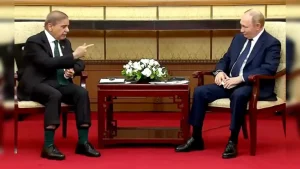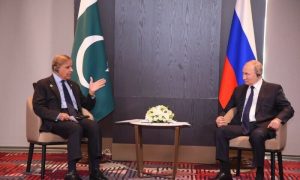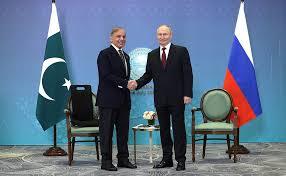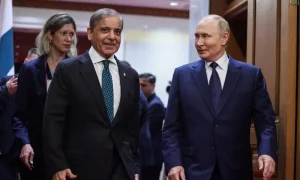Tianjin, China – The diplomatic meeting where Shehbaz Sharif Meets Putin took place on Tuesday in Beijing, marking a significant moment in Pakistan-Russia relations as both leaders participated in the Shanghai Cooperation Organisation summit in Tianjin. The encounter between Pakistani Prime Minister Shehbaz Sharif and Russian President Vladimir Putin highlighted the evolving geopolitical landscape in South Asia and demonstrated Pakistan’s strategic approach to regional diplomacy.
Both leaders traveled to China not only for the SCO summit but also to attend a grand parade commemorating the 80th anniversary of the Chinese People’s War of Resistance Against Japanese Aggression, scheduled for Wednesday. This context provided an ideal backdrop for the high-level diplomatic engagement that would shape future bilateral cooperation.
Acknowledging India-Russia Relations While Building Pakistan-Russia Ties

During the significant encounter when Shehbaz Sharif Meets Putin, the Pakistani Prime Minister demonstrated remarkable diplomatic maturity by explicitly acknowledging and respecting Russia’s established relationship with India. This acknowledgment represents a sophisticated understanding of regional dynamics and Moscow’s multiple strategic partnerships in South Asia.
“I must say that we respect your relations with India. That is perfectly fine. But we also want to build very strong relations with Russia. And these relations will be supplementary and complementary for the good and for the progress and prosperity of the region,” Sharif stated during their discussion.
This balanced approach during the meeting where Shehbaz Sharif Meets Putin reflects Pakistan’s mature diplomatic strategy of seeking enhanced bilateral cooperation without demanding exclusivity or creating unnecessary regional tensions. The Pakistani leader’s recognition of Russia’s multi-dimensional foreign policy approach in South Asia demonstrates strategic wisdom.
Expressing Gratitude for Russian Regional Support


The conversation when Shehbaz Sharif Meets Putin included expressions of appreciation from the Pakistani side for Russia’s supportive stance toward Pakistan, which Sharif characterized as representing “a balancing act in the region.” This acknowledgment suggests that Pakistan views Russia’s engagement as contributing to regional stability and strategic equilibrium.
Also Read: Big Statement By Peter Navarro On India; Slam Modi’s Russia-China Ties
Sharif emphasized to Putin that bilateral relations between their countries “have only improved over the past many years” and attributed this progress to the Russian president’s “commitment and interest in many areas.” The Pakistani Prime Minister’s praise for Putin as “a very dynamic leader” underscored his administration’s positive assessment of Russian leadership.
Comprehensive Cooperation Framework Proposed
During the substantive discussions when Shehbaz Sharif Meets Putin, the Pakistani leader outlined an ambitious agenda for expanding bilateral cooperation across multiple sectors. Sharif expressed Pakistan’s eagerness to strengthen ties in “trade connectivity, energy, agriculture, investment, defence, artificial intelligence, education, culture and people-to-people exchanges.”
This comprehensive approach demonstrates Pakistan’s vision for deepening the relationship beyond traditional diplomatic engagement to encompass economic, technological, and cultural dimensions. The breadth of proposed cooperation areas reflects both countries’ recognition of mutual benefits from enhanced partnership.
President Putin responded positively to these proposals, noting the upward trajectory of Pakistan-Russia relations and emphasizing the importance of collaboration within organizations such as the SCO. Putin stressed that such cooperation could play a major role in regional and global security and stability.
Global and Regional Issues Discussion


The agenda when Shehbaz Sharif Meets Putin extended beyond bilateral matters to encompass significant regional and global challenges. Both leaders discussed the complex situation in South Asia, ongoing developments in Afghanistan, evolving Middle East dynamics, and the continuing Ukraine conflict.
The conversation also addressed long-standing international disputes of global interest, including the Palestine question and the Kashmir issue. This comprehensive discussion demonstrates both leaders’ understanding of the interconnected nature of regional security challenges and their commitment to addressing them through diplomatic dialogue.
The inclusion of these sensitive topics in their discussion when Shehbaz Sharif Meets Putin reflects the level of trust and diplomatic maturity that has developed between Pakistan and Russia, allowing for frank exchanges on contentious international issues.
November Russia Visit Invitation Accepted


A significant outcome of the meeting when Shehbaz Sharif Meets Putin was the Russian president’s invitation for the Pakistani Prime Minister to visit Russia in November to participate in an SCO event for heads of government. Sharif’s immediate positive response, stating “I would be very happy to visit Russia,” signals the momentum building in bilateral relations.
This upcoming visit represents another milestone in the evolving Pakistan-Russia partnership and provides an opportunity for deeper engagement on bilateral and multilateral issues. The timing of the visit, coinciding with an SCO event, underscores the importance both countries place on multilateral cooperation frameworks.
Historical Transformation from Cold War Hostility
The successful encounter when Shehbaz Sharif Meets Putin represents a remarkable transformation in Pakistan-Russia relations, which have evolved significantly from Cold War-era hostility to current cooperative engagement. This historical evolution reflects changing geopolitical realities and both countries’ pragmatic approach to international relations.
The relationship’s journey from adversarial positioning during the Cold War to today’s cooperative framework demonstrates the possibility of diplomatic transformation when mutual interests align. Recent years have witnessed both countries actively working to strengthen bilateral ties, with the current meeting representing the culmination of sustained diplomatic efforts.
This diplomatic evolution provides hope for further expansion of cooperation in coming years, as both nations recognize the strategic value of their partnership in addressing regional challenges and pursuing mutual development goals.

